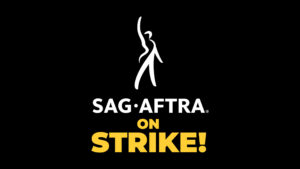
The 2023 SAG-AFTRA strike has taken a toll on many in the entertainment industry as the American actors’ union rallied to protest ongoing labor disputes on July 14.
For months, the union marched the picket line alongside the Writers’ Guild of America, whose strike was initiated before SAG-AFTRA’s due to stagnant compensation following the rapid integration of television streaming services.
The WGA strike began May 2 and ended Sept. 27 because of a tentative agreement between the guild and major studios. However, the SAG-AFTRA fight continues.
Britnee Blake, a junior digital media production major at Florida State University, fully supports the strike and advocates for improvements as a newcomer filmmaker herself.
“I know that viewers are annoyed with the strike because shows/movies aren’t being released or written, but I think having these months of nothing can really allow the industry to make necessary changes,” Blake said. “Because writers are the heartbeat of films [and] shows, and the unfairly paid actors build the characters we know and love.”
Completely altering the television and movie cycle for the second half of 2023, the strike has paused several industry projects’ production, development and promotion.
Union members follow strict rules to ensure they stand together to make a statement to the entertainment companies and streamers and, hopefully, receive a “fair contract.”
Over 2,000 miles separate Hollywood, Calif., from Tallahassee, but while the state of the SAG-AFTRA strike remains inconclusive, the students and faculty at Florida A&M and Florida State, weigh in on their concerns and comments on what this could mean for their future as well as for their peers.
Rebekah Tyson, a fourth-year theater performance major at FAMU, is highly interested in continuing her career post-graduation in the entertainment industry. Having previously been worried about the strike, she acknowledges other prospects for her.
“[The strike] may be a little difficult for film considering the circumstances, but there are always independent filmmakers that are looking for actors too,” Tyson said. “I guess it really depends on what you’re looking for. I personally like working in theater. There are always theaters looking to cast new talent, provide opportunities to work in summer stock, as well as cruise lines, and even opportunities to work behind the scenes as crew or [stage manager].”
Initially, filmmakers who aren’t affiliated with the AMPTP, and are considered independent, were exempt from the SAG-AFTRA strike terms. As of August, the union announced it will no longer approve projects as the strike continues, but this change only affects actors who are currently part of the union.
Student and community filmmakers like Blake, who is a “firm believer in working independently and finding projects within your community,” and has been releasing projects since May, aren’t bound by any outside obstacles when creating new projects.
“As a non-union creator, projects haven’t stopped for me, but I was able to realize how important it is to be connected to the creatives around you to still make projects,” Blake said. “But definitely, as I grow in my field, I want to pursue bigger projects — especially in Los Angeles and New York – so I know I need to be conscious of what’s going on in the industry.”
Making connections during the uncertainty of the industry’s future can be an asset for aspiring creators.
FSU’s Dean Braddock of the university’s College of Motion Picture Arts encourages his upperclassmen students to “bond with their fellow artists.” He suggests they gain contacts and trust with people within the industry to help them network as they wait for the strike to pass, calling it a “street” internship.
“The film business is just like any other business. The struggle between management and labor is necessary and inevitable. Strikes will happen, but they also end,” Braddock said. “While the loss of internships and work opportunities are a casualty of that important struggle, there also rises an even greater opportunity. That’s the powerful networking and solidarity that can come from going out and getting on that picket line.”
While the concerns for their futures are valid, students also understand that time is on their side.
Associate Director of Theater at FAMU, director Luther Wells, reminds students that there is a list of steps that must be completed to even become eligible for membership with the union, and they should focus on building professional work and credits.
“I’m not really concerned about things for [students] at this stage,” Wells said. “I think by the time they graduate and get to the position where they are able to join the union and all of that, then all of this will have blown over, which it’s already starting to happen.”
Recent updates suggest that the SAG-AFTRA strike is near its end. It’s only a matter of time and a favorable agreement.
Despite the distance, Tallahassee arts students have taken this as a chance to learn while also serving as a reminder of their worth and that there are still opportunities for them.
“I’d solely work with companies that respect cast and crew’s wages, don’t overwork either, and appreciate what they both bring to production,” Blake said. “And I’m considering wanting to work within a union, so it’s beneficial to see how Hollywood is going about the situation with crew [and] writers right now. I’m learning a lot and defining my non-negotiables for my future creative spaces.”